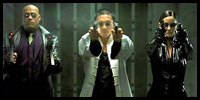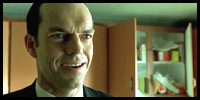
 |
|
The Matrix Revolutions (2003) Cast: Keanu Reeves, Carrie-Anne Moss, Laurence Fishburne, Jada Pinkett Smith, Hugo Weaving, Mary Alice, Harold Perrineau, Nona Gaye, Clayton Watson, Ian Bliss, Sing Ngai, Bruce Spence, Harry Lennix, Anthony Zerbe, Tanveer Atwal, Essie Davis, Lambert Wilson, Monica Bellucci, Nathaniel Lees, Bernard White, Tharini Mudaliar 2003 – 129 minutes Rated: Reviewed by Dustin Putman, November 7, 2003.  "Some things in this world never change," says brave pilot Niobe (Jada Pinkett Smith) to ex-lover and co-pilot Morpheus (Laurence Fishburne), "and some things do." She's not kidding. In the case of "The Matrix Revolutions," the much-ballyhooed final chapter in writer-director-brothers Andy and Larry Wachowski's wildly popular sci-fi trilogy, everything that has changed has been for the worse. Stripped of the innovation and wonder of 1999's "The Matrix" and the awe-inspiringly exciting action setpieces of 2003's "The Matrix Reloaded," "The Matrix Revolutions" is shockingly bad in almost every respect. Alarmingly disastrous. Mindnumbingly dull. A woeful, sloppy, misbegotten load of crap. In other words, it makes its two predecessors—neither of which I actually recommended—look like examples of modern cinematic masterpieces in comparison.
"Some things in this world never change," says brave pilot Niobe (Jada Pinkett Smith) to ex-lover and co-pilot Morpheus (Laurence Fishburne), "and some things do." She's not kidding. In the case of "The Matrix Revolutions," the much-ballyhooed final chapter in writer-director-brothers Andy and Larry Wachowski's wildly popular sci-fi trilogy, everything that has changed has been for the worse. Stripped of the innovation and wonder of 1999's "The Matrix" and the awe-inspiringly exciting action setpieces of 2003's "The Matrix Reloaded," "The Matrix Revolutions" is shockingly bad in almost every respect. Alarmingly disastrous. Mindnumbingly dull. A woeful, sloppy, misbegotten load of crap. In other words, it makes its two predecessors—neither of which I actually recommended—look like examples of modern cinematic masterpieces in comparison.
 Picking up directly where "The Matrix Reloaded" left off, "Revolutions" finds the Machines' planned attack on the grimy industrial city of Zion a mere twenty hours away. With Neo (Keanu Reeves) in a coma, stuck somewhere between the real world and the matrix, Morpheus and Trinity (Carrie-Anne Moss) pay a visit to the Oracle (Mary Alice) in an attempt to garner the answers needed to find him. Meanwhile, soldier pilot Niobe and her crew begin preparations for the war—a world-changing battle that the Oracle later assures Neo will, whether good or bad, come to an end.
Picking up directly where "The Matrix Reloaded" left off, "Revolutions" finds the Machines' planned attack on the grimy industrial city of Zion a mere twenty hours away. With Neo (Keanu Reeves) in a coma, stuck somewhere between the real world and the matrix, Morpheus and Trinity (Carrie-Anne Moss) pay a visit to the Oracle (Mary Alice) in an attempt to garner the answers needed to find him. Meanwhile, soldier pilot Niobe and her crew begin preparations for the war—a world-changing battle that the Oracle later assures Neo will, whether good or bad, come to an end.
 Under the sickeningly pretentious, hack-induced helm of the Wachowski brothers, that ending cannot come fast enough. The first half—even more than in "Reloaded"—is dedicated to so much drawn-out, unnecessary, needlessly complicated exposition that it quickly becomes both maddening and laughable. While all the talk and questions posed in "Reloaded" were also on the lengthy side, there was at least a semi-intriguing air about the proceedings. "Revolutions" does nothing more than ask a round of new convoluted questions, albeit more clumsily, and then doesn't even bother answering most of them. In the grand scheme of concluding trilogies, isn't that tantamount to blasphemy?
Under the sickeningly pretentious, hack-induced helm of the Wachowski brothers, that ending cannot come fast enough. The first half—even more than in "Reloaded"—is dedicated to so much drawn-out, unnecessary, needlessly complicated exposition that it quickly becomes both maddening and laughable. While all the talk and questions posed in "Reloaded" were also on the lengthy side, there was at least a semi-intriguing air about the proceedings. "Revolutions" does nothing more than ask a round of new convoluted questions, albeit more clumsily, and then doesn't even bother answering most of them. In the grand scheme of concluding trilogies, isn't that tantamount to blasphemy?
 For all of its expository elements, viewers of "The Matrix Reloaded" were repaid with two mindblowing action scenes—a fight between Neo and hundreds of clones of Agent Smith (Hugo Weaving), and a tour de force 14-minute highway chase—that boasted some of the more amazing visual effects in filmmaking history. If only for roughly a half-hour, "Reloaded" at least held the power to inspire, excite, and truly invigorate. The two central action sequences in "The Matrix Revolutions"—the extended battle between Zion and the machines, and the climactic fight-to-the-death between Neo and Agent Smith amidst the matrix cityscape—play like rancid, months-old leftovers. They are all flash and lightning, C-grade genre imitations with nary an original idea or image in their noisy little heads. Not only do they lack even the faintest form of excitement, they are about as incoherent as they are emotionally sterile. You sit in your seat staring at a screen with millions upon millions of dollars projected upon it, and you simply are not for a second led to care at all about anyone or anything onscreen. The situations are often nonsensical, the characters are walking one-dimensional cliches, and their motivations are frustratingly cloudy.
For all of its expository elements, viewers of "The Matrix Reloaded" were repaid with two mindblowing action scenes—a fight between Neo and hundreds of clones of Agent Smith (Hugo Weaving), and a tour de force 14-minute highway chase—that boasted some of the more amazing visual effects in filmmaking history. If only for roughly a half-hour, "Reloaded" at least held the power to inspire, excite, and truly invigorate. The two central action sequences in "The Matrix Revolutions"—the extended battle between Zion and the machines, and the climactic fight-to-the-death between Neo and Agent Smith amidst the matrix cityscape—play like rancid, months-old leftovers. They are all flash and lightning, C-grade genre imitations with nary an original idea or image in their noisy little heads. Not only do they lack even the faintest form of excitement, they are about as incoherent as they are emotionally sterile. You sit in your seat staring at a screen with millions upon millions of dollars projected upon it, and you simply are not for a second led to care at all about anyone or anything onscreen. The situations are often nonsensical, the characters are walking one-dimensional cliches, and their motivations are frustratingly cloudy.
 Keanu Reeves (2001's "Hardball") has ceased being cool as Neo and, in the course of the series, has transformed him from oh-so-cool into a thoroughly uninteresting, humorless deadweight. The same goes for fellow leads Carrie-Anne Moss (2000's "Red Planet"), looking haggard and distracted as Trinity, and Laurence Fishburne (2003's "Mystic River"), whose originally badass role of Morpheus has become virtually transparent. These three protagonists take everything so seriously, and talk in such eternally solemn, hushed tones, that they have become enormous bores. The only performers who try to inject anything different into their scenes are Jada Pinkett Smith (2001's "Ali"), who in one shocking moment actually smiles, and Mary Alice (2002's "Sunshine State"), commendably taking over the role of the Oracle from the late Gloria Foster. Alice offers real warmth, sympathy, and wisdom in her scenes, which are close to being the only ones in the entire picture that work.
Keanu Reeves (2001's "Hardball") has ceased being cool as Neo and, in the course of the series, has transformed him from oh-so-cool into a thoroughly uninteresting, humorless deadweight. The same goes for fellow leads Carrie-Anne Moss (2000's "Red Planet"), looking haggard and distracted as Trinity, and Laurence Fishburne (2003's "Mystic River"), whose originally badass role of Morpheus has become virtually transparent. These three protagonists take everything so seriously, and talk in such eternally solemn, hushed tones, that they have become enormous bores. The only performers who try to inject anything different into their scenes are Jada Pinkett Smith (2001's "Ali"), who in one shocking moment actually smiles, and Mary Alice (2002's "Sunshine State"), commendably taking over the role of the Oracle from the late Gloria Foster. Alice offers real warmth, sympathy, and wisdom in her scenes, which are close to being the only ones in the entire picture that work.
 If, going into "The Matrix Revolutions," you expect to finally find out what role internal controllers Merovingian (Lambert Wilson) and Persephone (Monica Bellucci) are playing in the grand scheme of things, or are waiting to discover who the Architect is, or plan on some great truth about life or human nature arising, you are in for a rude awakening. The Wachowski brothers started off "The Matrix" series with a visionary first film that easily could stand on its own two feet, and have proceeded to jerk its audience around ever since. The writing this time around is haphazard, so long-winded and melodramatic it's difficult to believe anyone could take it seriously, while the action setpieces are a bombastic mess. As for the romance between Neo and Trinity, it has been so drained of its passion and the characters' natural chemistry that it no longer holds any value. The Wachowski's have clearly not thought out their story satisfactorily, and have spent a ridiculous amount of time (three films and seven hours, in fact) to tell what ultimately amounts to a simple idea that could have been edited down to 100 minutes (for a sterling example, check out 1998's similar, grandly superior "Dark City").
If, going into "The Matrix Revolutions," you expect to finally find out what role internal controllers Merovingian (Lambert Wilson) and Persephone (Monica Bellucci) are playing in the grand scheme of things, or are waiting to discover who the Architect is, or plan on some great truth about life or human nature arising, you are in for a rude awakening. The Wachowski brothers started off "The Matrix" series with a visionary first film that easily could stand on its own two feet, and have proceeded to jerk its audience around ever since. The writing this time around is haphazard, so long-winded and melodramatic it's difficult to believe anyone could take it seriously, while the action setpieces are a bombastic mess. As for the romance between Neo and Trinity, it has been so drained of its passion and the characters' natural chemistry that it no longer holds any value. The Wachowski's have clearly not thought out their story satisfactorily, and have spent a ridiculous amount of time (three films and seven hours, in fact) to tell what ultimately amounts to a simple idea that could have been edited down to 100 minutes (for a sterling example, check out 1998's similar, grandly superior "Dark City").
 "The Matrix Revolutions" is a really awful movie any way you look at it. Whereas the original film held a joy and magic of storytelling, a rare imagination, a sense of wonder, and an undeniable energy, even amidst its many glaring flaws, "The Matrix Revolutions" is totally exempt of these things. It's an eye-candy extravaganza without a pulse.
"The Matrix Revolutions" is a really awful movie any way you look at it. Whereas the original film held a joy and magic of storytelling, a rare imagination, a sense of wonder, and an undeniable energy, even amidst its many glaring flaws, "The Matrix Revolutions" is totally exempt of these things. It's an eye-candy extravaganza without a pulse.
|
© 2003 by Dustin Putman |














